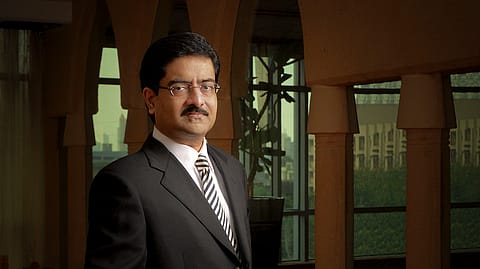Kumar Mangalam Birla: As acquisitive as ever
The Aditya Birla Group has used an inorganic growth strategy over the years. Hindalco’s latest purchase of aluminium firm Aleris will help it diversify its product basket and counter risks.

In 2007, a day after Hindalco Industries announced its intention to acquire U.S. aluminium maker Novelis for $6 billion, the Aditya Birla Group company’s stock price fell close to 5% on the BSE. Cut to 2018, and something similar happened when Hindalco’s share price declined 1.07% a day after it announced it had agreed to acquire another U.S.-based aluminium products manufacturer, Aleris, for $2.58 billion. A knee-jerk reaction from the market to acquisitions announced by the $44 billion Aditya Birla Group, with interests ranging from metals and mining to retail and telecom, isn’t unexpected. Something similar happened when another group firm, UltraTech Cement, announced the acquisition of Jaypee Cement’s assets in Gujarat in 2013. Each time, Aditya Birla Group chairman Kumar Mangalam Birla appeared to know something the market didn’t immediately grasp, for most of the inorganic growth decisions taken by the 51-year-old industrialist have created value for the group.
Take Novelis, for instance. The U.S.-based company, which makes downstream products like rolled aluminium for beverage cans and aluminium sheets for automotive use, now accounts for a lion’s share of Hindalco’s consolidated revenues and profitability. It accounted for 62% of Hindalco’s consolidated revenues for FY18 ( ₹1,15,818 crore) and close to 56% of operating profits ( ₹14,189 crore).
In a recent interview to a business news website, Birla said that each of the Aditya Birla Group’s acquisitions had a purpose and was value accretive, at least in the medium term. Since 1998, the Aditya Birla Group has acquired at least 24 businesses across industries (see box), which has helped it grow into one of India’s biggest diversified groups. It is also in the midst of two key M&A transactions that are underway —the amalgamation of Vodafone India’s wireless telephony business with Idea Cellular; and a disputed bid to take over Binani Cement through the insolvency and bankruptcy process.
Since the Novelis acquisition was announced in February 2007, Hindalco’s market capitalisation has risen 160% to ₹49,182 crore as on August 7, 2018. The S&P BSE Metals Index has gained 150% in the same period. Birla hopes to do an encore with Aleris by exploiting synergies with Novelis’ existing business. “The acquisition of Aleris will help diversify our product and customer mix and give us a presence in market segments where we weren’t present in before, like aerospace,” Birla told a press conference in Mumbai to announce the deal on July 26. “This is in keeping with our strategy on adding high-value and high-margin products to our portfolio, which will reduce our dependence on the LME (London Metal Exchange) and, therefore, ensure reduced volatility.
At present, around 61% of Novelis’ product portfolio comprises cans it makes for food and beverages, while auto constitutes 20%. After the Aleris acquisition, the share of cans will fall to 47%, while new verticals like buildings, construction, trucks and trailers (8%), and aerospace (4%) will get added. “We believe the Aleris acquisition is a good fit as it diversifies Novelis’ product offerings and enhances the profitable auto footprint. We see long-term gain for Novelis as the deal reinforces its fast growing profitable auto segment; provides an entry into the aerospace segment; offers potential synergies in U.S., Europe and China operations; and is likely to generate returns from (the quarter ending September 30, 2018) itself as Aleris’ capex cycle is over,” says a research report by Edelweiss Securities dated July 26.
The consideration that Hindalco is paying for Aleris values the company at 7.2 times the target company’s projected earnings before interest, tax, depreciation and amortisation (Ebitda) of $360 billion. That, according to Birla, is an attractive valuation for the company, given the quality of its assets around the world. The combined entity (Novelis and Aleris) will have revenues of $21 billion, and aluminium production of 4.7 million tonnes per annum.
Novelis has a consolidated net debt of $3.5 billion and another $2.6 billion of fresh debt will be added on account of the Aleris acquisition. The management is confident that even with the fresh debt coming on to Novelis’ books, the net debt to adjusted Ebitda (accounting for future Ebitda accrual from Aleris) will remain at a level of under 4:1, and will further reduce to under 3:1 as operational synergies kick in.
Recommended Stories
Over the past five years, Aleris—which boasts marquee clients including Airbus, Boeing, Jaguar Land Rover, Audi, MercedesBenz, and Volkswagen—has made a $900 million investment to expand its capacity across locations such as the U.S. and China (where Novelis has an existing plant in close proximity to that of Aleris). With the entire investment put on the ground already, Hindalco expects to benefit from rapid capacity ramp-up.
“All major metal players are pursuing a strategy of expanding their value-added product offerings, as a pure commodity play is subject to volatility of business cycles and margins,” says Anjani K. Agrawal, metals and mining leader at consulting firm EY. “There are only about three or four assets like Aleris globally and they are strategic targets for global aluminium producers.”
(This article was originally published in the September 2018 issue of the magazine.)